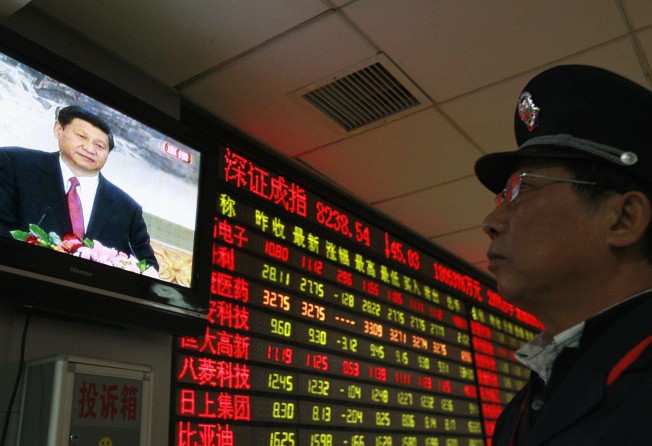Invisible hand of the market gives way to the visible hand of the Party at China’s state-owned firms
Citic Group’s volte-face is an example of how politics takes precedence over economics in corporate affairs

Citic Group Corporation is revising its Articles of Association to specify “the leading status, establishment and operation” of the Chinese Communist Party committee”, it said in a recent report to the Central Commission for Discipline Inspection, the Party’s graft fighter.
The move, however, sounded the death knell for President Xi Jinping’s planned reforms to give private capital and the market a bigger role in the economy, by co-opting entrepreneurs and career managers to state firms. Citic was to be the flag bearer of this reform.
Within months of Xi making the pledge, Beijing approved Citic’s bold plan to inject all of its 227 billion yuan (HK$263.4 billion) worth of assets into Citic Pacific, its Hong Kong-listed subsidiary.
By doing so the conglomerate moved its incorporation from the mainland to Hong Kong, thereby making possible various reforms. It later sold a 20 per cent stake to several international and local investors.
Back then, a confident Chairman Chang Zhenming called Citic the “pioneer” of state sector reform. Other State firms followed Citic’s footsteps. Sinopec commemorated the 2014 birthday of the Communist Party by selling 30 per cent of its gas stations subsidiary to private investors and unveiled a plan to bring in career managers. Hopes were high for further market reforms.
But, in less than a year, the tune has changed. Politics has pushed back the baby steps made by the market.
When Xi cited the weak Party establishment as the root cause for corporate corruption and all other illness, the anti-graft investigations into state firms turned into a battle for control from the middle of last year.
CCD officials no longer dedicated their reports to expensive golf games, luxurious sedans and the first class travel of corporate managers. Instead, the feeble, if not non-existent, Party committees became the centre of attention. Not surprisingly the CCD’s criticism of Citic was the most damning.
“Its Party committee mainly talked business with little or no mention of the Party and politics,”said an inspection report posted on the commission’s website. This would have got a lot of praise in the old days. But now it is seen as a curse.
The Citic Party committee was guilty of discussing only key personnel issues but not other important matters. The Party committee did not hold any meetings of its own and most of the times it was an extended session of the management meetings. Citic was also guilty of allowing the Party establishment to disappear further down the corporate hierarchy and Party members not joining the Party establishment.
This long list of wrongdoing, which was seen in almost every other state firms, told what state managers have been trying over decades to reduce the influence of the Party and non-market forces.
The Party’s role has been limited to the appointment of key officials such as chairman, general manager and board members. All of the above have to be rectified now.
Echoing the general consensus of other state firm, Citic also pledged to revise its articles of association to give its Party committee a legal status.
The committee would be consulted on all important policy changes; personnel appointments; project investment and the use of large sums. The appointments include those for the remuneration, audit as well as strategic committee under the board. All of its 27 subsidiaries now have their own Party committees which are served by 170 employees. These would also be funded by the company.
In short, the “invisible” god has been reborn into one with flesh and blood; so also the intervention that comes with it.
How can this be possible? Isn’t the Hong Kong incorporated Citic governed by the Company Ordinance that lists the board and shareholders’ meeting as the governing body of a company? How can the dominance of a Party committee reconcile with that?
The best answer came from Sinopec, the other poster boy of the market-led reform.
At this year’s founding anniversary of the Party, fists in the air and eyes on the red hammer and sickle flag, ten thousand Sinopec managers took an oath pledging their full allegiance to the Party. Leading the ceremony was Sinopec’s Party Secretary and Chairman Wang Yupu, who said: “State firms should never emphasise economics over politics as we are in the market and face competition. Neither should we lower, resist or deny the Party’s leadership in the name of alignment with international practises.”
When allegiance is at stake, obviously there is no room for question.